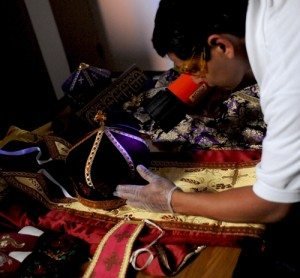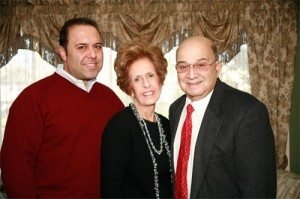Two Armenian brothers introduced Paris to caviar in the 1920’s. In our time, Armenians continue to expand the frontiers of sophistication. John Mahdessian, president of Madame Paulette, inherited a third-generation family business in the 1980’s and quickly transformed it into the world’s leading custom couture cleaner. From restoring historic gowns and family heirlooms to interior cleaning of private yachts and estates, Madame Paulette is the vanguard of its industry in every imaginable service. Remarkably, what drives the most trusted man of the world’s renowned fashion design houses is not a desire for fame or wealth but rather an overwhelming love for his family and an intense pride in his Armenian heritage.

John Mahdessian’s great uncle founded Madame Paulette in the 1950’s, after emigrating from Cyprus and marrying a French woman who later lent her name to the budding Upper East Side dry-cleaning business. Mahdessian’s father, Noubar Mahdessian, soon began working for his uncle by day and attending classes at New York University by night. “My father’s aspirations were in accounting but after his uncle got sick, he had to work full time to support the business,” Mahdessian explains. “My uncle didn’t get any better, and my father had to take over the business not by choice but by obligation to the family.”
Noubar Mahdessian had to support not only his uncle’s family but also his mother, his sister, and his new wife. Of course, this responsibility was not without its setbacks. Part of the store was destroyed due to a fire, and the insurance only covered half of the restoration cost. “Most people would have filed for Chapter 11, but my father was committed to keeping the business. He borrowed money and paid everyone back in cash and credit over the next five years.”
From a young age, John Mahdessian inherited his father’s dedication to hard work. “I remember as a child my dad used to give me a wire hanger and tissue, and for each one that I made he would give me a penny. So, I would assemble hundreds of them and get two dollars.” In high school, Mahdessian sold items at the flea market. By college, he was selling real estate. “It never occurred to me that I was too young to do these things. I just knew that I had an amazing family that would pick me up anytime I fell down. There wasn’t anything that I didn’t think I could do,” he says.

While Mahdessian was in college, his mother, Ann Mahdessian, had given up her job as a school teacher so that she could help Mahdessian’s ill father run the family business. After graduating from college, Mahdessian had secured a high-paying job in investment banking, but before starting his career, he decided to help his father for a month. “And it was then that I watched my dad, and I realized that even if I made millions of dollars on Wall Street, he wouldn’t be around to enjoy it.” Mahdessian felt instantly obligated to continue the business and gave up his Wall Street ambitions. Within a mere six months, he was able to retire his father.
“Every day, I challenge myself, and it’s a different situation,” Mahdessian says, “You just have to figure out everything on your own. It was a lot of methodical testing and pioneering in this industry.” Mahdessian remembers an early project, in which a socialite wanted to donate a hundred dresses to a museum. Unfortunately, the dresses were damaged in a flood, and the dyes transferred onto each other after someone had put the dresses into a garbage bag. “When I opened the bag, I couldn’t believe it. Colors bled onto each other. Mildew started growing. They compounded the problem.” For over a year, Mahdessian spent every minute of his free time taking apart each garment, testing each fabric with different solutions at varying temperatures, and lastly re-stitching each dress by hand. “Out of the 100 pieces that were lost in history, I brought back 90 of them. And that was remarkable,” Mahdessian recounts.
Today, Madame Paulette is a nationwide brand that represents the very best in its industry. Mahdessian explains that Madame Paulette has achieved such renown due “its pioneering of new cleaning techniques and processes.” With more than 50 billionaires as active clients and recognition for its work at the Trump wedding, at VOGUE photo shoots, and at the Chanel and AngloMania Exhibits at the Metropolitan Museum of Art, Madame Paulette certainly does not have to go after clients the way any other business would. Instead, it is widely recognized by the best demographic clientele in the world.
Madame Paulette will once again set a new standard in its industry, with Mahdessian’s newest venture: the opening of a posh boutique. “I took over half the block on 2nd Avenue between 65th and 66th Streets, in a landmark building where Grace Kelley lived.” The boutique has custom furniture, custom chandeliers, and custom fabrics. Not surprisingly, its interior designer is Armenian. Taittinger (one of Madame Paulette’s luxury partners) will be pouring visitors champagne. “The dressing rooms will have the ultimate lighting features, and we will ask each client what the event is for—day, evening, or night—and we’ll set the light accordingly,” Mahdessian explains. “We also have a black light, so we can inspect the gown on the client and see stains not visible to the naked eye.” The boutique will have its grand opening in late February. “It will provide the ultimate in service. There probably isn’t a nicer boutique, which I know of, in Manhattan.”
Mahdessian attributes his success to his Armenian heritage. His grandfather was a survivor of the Armenian genocide. “At the age of seven, my grandfather watched his father and his brother get shot, and his mother and sister become slaves on their own estate.” Mahdessian’s grandfather was put into an orphanage to be converted to Islam, but his mother planned an escape with a distant relative living in the United States. “I heard many stories, as a child, from my grandfather. He would tell me how he worked from 10 years old on in the United States, and when he went to school, he had to wear newspapers around his shoes. The kids would make fun of him, because he couldn’t afford a new pair,” Mahdessian says. “Those are the things that I remember, so for me to work 12-15 hours a day, 6 to 7 days a week, is nothing compared to what he had to go through.”
“My family sacrificed everything to get us where we are today, and that is something that I never take for granted,” Mahdessian explains. “I feel it’s my obligation to make sure my parents live comfortably, and I feel happy and blessed that I have the ability to do so.” Looking toward the future, Mahdessian is not shy about his desire to marry an Armenian woman. He feels strongly about passing on his success, his abilities, and his heritage. But when it comes to looking for his perfect match, Mahdessian jokes, “I just don’t have enough time, because I’m keeping the world spotless.”


Very intersting to hear about both brothers